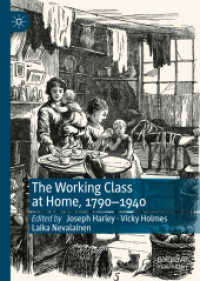Full Description
This is the first New Directions volume related to young adult learners since 1984. Then, as now, young adults are an important segment of the adult population but have received scant attention in the adult education literature. Increasingly, youths and young adults are enrolling in adult education programs and in doing so are changing the meaning of adulthood. Given the significant demographic, technological, and cultural shifts during the past 30 years, there is an increasing need for practitioners and program planners to reconsider what constitutes adult and adult education. An understanding of the changing meaning of adulthood is fundamental to developing programs and policies that will address the needs of younger learners, and we believe it is time for an updated discussion among adult educators and scholars in other disciplines. This sourcebook is designed to reignite the discussion related to meeting the educational needs of young adults along with a timely and interdisciplinary discussion that highlights the transitional needs of young adult learners. This is the 143rd volume of the Jossey Bass series New Directions for Adult and Continuing Education.
Noted for its depth of coverage, it explores issues of common interest to instructors, administrators, counselors, and policymakers in a broad range of education settings, such as colleges and universities, extension programs, businesses, libraries, and museums.
Contents
EDITORS' NOTES 1 C. Amelia Davis, Joann S. Olson 1. Conceptualizing Transitions to Adulthood 5 Johanna Wyn This opening chapter lays the groundwork for this volume by providing an overview of adult development theories as they relate to the transition to young adulthood along with a discussion of the blurring between youth and adult due to the ambiguity encountered when trying to define adulthood. 2. Culture, Conditions, and the Transition to Adulthood 17 Brendaly Drayton An individual s culture shapes both the definition of adult and the experience of the transition to adulthood. Furthermore, the transition to adulthood may serve as a time when an individual s cultural identity is more consciously defined and more personally salient. This chapter explores the intersection of culture and adulthood. 3. Vulnerable Youth and Transitions to Adulthood 29 Rongbing Xie, Bisakha (Pia) Sen, E. Michael Foster This chapter discusses recent research conducted that identified challenges youth in the mental health system, the foster care system, and the juvenile justice system face in their transition to adulthood due to limited support systems. 4. Young Adulthood, Transitions, and Dis/ability 39 Jessica Nina Lester A discussion focusing on the social transitions to adulthood and independent living of an often forgotten population in adult education, young adults labeled with (dis)abilities. 5. Becoming an Adult in a Community of Faith 51 Steven B. Frye The vitality and ongoing existence of any community of faith regardless of the specific religious tradition depends on incorporating the next generation as full participants. This chapter focuses on how the transition to adulthood is transacted within various religious traditions and the extent to which that transition is a place where nonformal learning takes place. 6. Youths Transitioning as Adult Learners 63 C. Amelia Davis This chapter conceptualizes transitions with a focus on Adult Basic Education/GED students as they transition from high school to adult education. 7. Transitions From Formal Education to the Workplace 73 Joann S. Olson This chapter frames the transition to adulthood in the context of the moving from formal educational settings (e.g., high school, postsecondary education) to the often less-structured learning that occurs in workplace settings. 8. Themes and Issues in Programming for Young Adults 83 Joann S. Olson, C. Amelia Davis In this final chapter, recurring themes from the preceding chapters are identified and discussed as they pertain to program planning and instructional practice. INDEX 89







